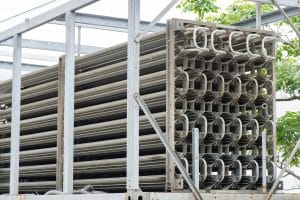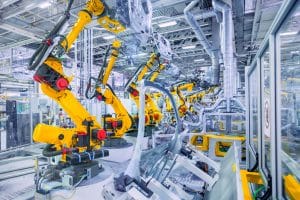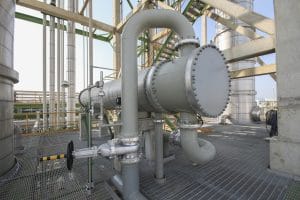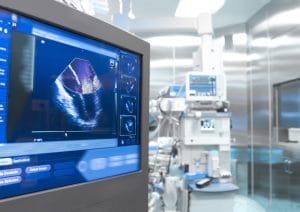 Heat exchangers of all types are preferable for a wide range of applications in virtually every type of industry. However, some types of heat exchangers are better suited to certain conditions, and choosing the right solution depends on what those conditions are. For instance, while ambient heat exchangers are often the most efficient solution, some applications may require heat exchangers to provide cooling below the ambient temperature outside of the enclosure. When selecting the most appropriate thermal management solution, companies must consider what that solution will have to achieve. (more…)
Heat exchangers of all types are preferable for a wide range of applications in virtually every type of industry. However, some types of heat exchangers are better suited to certain conditions, and choosing the right solution depends on what those conditions are. For instance, while ambient heat exchangers are often the most efficient solution, some applications may require heat exchangers to provide cooling below the ambient temperature outside of the enclosure. When selecting the most appropriate thermal management solution, companies must consider what that solution will have to achieve. (more…)
What Control Panels Have to Do with Eco-Friendliness
 There are many ways for companies to streamline operations, automate redundant processes, and implement technologies that boost their productivity while lowering their environmental footprints. However, cooling electrical control panels and other enclosures isn’t always an obvious starting point. In most of today’s industries, particularly in manufacturing, technology and machinery are backbones of every company’s operations. Besides the power and efficiency of that technology, a company’s eco-friendly efforts are also impacted by the choice of thermal management for it. That’s why most companies today benefit from using a variety of heat exchangers to cool high-powered control panels and sensitive, high-performance technology, all while lowering energy costs and reducing the company’s environmental impact. (more…)
There are many ways for companies to streamline operations, automate redundant processes, and implement technologies that boost their productivity while lowering their environmental footprints. However, cooling electrical control panels and other enclosures isn’t always an obvious starting point. In most of today’s industries, particularly in manufacturing, technology and machinery are backbones of every company’s operations. Besides the power and efficiency of that technology, a company’s eco-friendly efforts are also impacted by the choice of thermal management for it. That’s why most companies today benefit from using a variety of heat exchangers to cool high-powered control panels and sensitive, high-performance technology, all while lowering energy costs and reducing the company’s environmental impact. (more…)
Benefits of 3D Prototyping Heat Exchanger Designs
 3D printing has been one of today’s most widely implemented technological advances. From construction and bio-printing to additive manufacturing processes, the ability to rapidly create digitally designed constructs has changed the way many companies operate. In the field of thermal management, 3D printing is often used as a vital part of the design and manufacturing process. Using the technology to rapidly produce prototypes of every product and part allows for highly precise results the first time around, allowing companies to benefit from advanced thermal management solutions faster. (more…)
3D printing has been one of today’s most widely implemented technological advances. From construction and bio-printing to additive manufacturing processes, the ability to rapidly create digitally designed constructs has changed the way many companies operate. In the field of thermal management, 3D printing is often used as a vital part of the design and manufacturing process. Using the technology to rapidly produce prototypes of every product and part allows for highly precise results the first time around, allowing companies to benefit from advanced thermal management solutions faster. (more…)
Heat Exchangers for High-Performance Computer Cooling
 For manufacturing and many other industries, heat exchangers are a well-known and often relied-upon solution for cooling electrical control panels and other large equipment. No matter the size of the application, more efficient and eco-friendly heat exchangers save companies significant amounts of time, money, and effort on essential thermal management. When heat exchanger concepts are miniaturized and applied to high-performance computing technology, they offer the same level of reliability and sustainability as they do for larger electrical enclosures. With the ability to rapidly transfer high amounts of waste heat continuously and without constant maintenance, heat exchangers continue to help high-performance computing technology become even more powerful. (more…)
For manufacturing and many other industries, heat exchangers are a well-known and often relied-upon solution for cooling electrical control panels and other large equipment. No matter the size of the application, more efficient and eco-friendly heat exchangers save companies significant amounts of time, money, and effort on essential thermal management. When heat exchanger concepts are miniaturized and applied to high-performance computing technology, they offer the same level of reliability and sustainability as they do for larger electrical enclosures. With the ability to rapidly transfer high amounts of waste heat continuously and without constant maintenance, heat exchangers continue to help high-performance computing technology become even more powerful. (more…)
A Few Eco-Friendly Aspects of Modern Heat Exchangers
 Efficiency and optimum productivity are among the most important factors of success for virtually any company. However, eco-friendliness is becoming increasingly more important not just for success, but also for overall sustainability. In the quest to implement cleaner, more sustainable practices, many companies turn to modern heat exchangers for a wide variety of thermal management needs. From cooling electrical control panels to facilitating processes like food sanitization, pharmaceutical chemistry, and more, the many eco-friendly aspects of heat exchangers make them a significant addition to most industries’ sustainability efforts. (more…)
Efficiency and optimum productivity are among the most important factors of success for virtually any company. However, eco-friendliness is becoming increasingly more important not just for success, but also for overall sustainability. In the quest to implement cleaner, more sustainable practices, many companies turn to modern heat exchangers for a wide variety of thermal management needs. From cooling electrical control panels to facilitating processes like food sanitization, pharmaceutical chemistry, and more, the many eco-friendly aspects of heat exchangers make them a significant addition to most industries’ sustainability efforts. (more…)
The Relationship Between Automation and Heat Exchangers
 With the ability to transfer electrical waste heat rather than overwhelming it with cold air, heat exchangers changed the way many companies think of thermal management by making it a much more affordable endeavor. Reduced energy usage and fewer maintenance concerns meant companies saved large amounts of money that could be reinvested elsewhere, propelling their growth and success. Yet, in addition to lower operating costs, heat exchangers also changed several industries by making it possible to evolve further and implement automated technology. The concepts of eco-friendly and highly reliable thermal management solutions that were made popular by heat exchangers also paved the way for technology that also operates with minimal waste or human input. (more…)
With the ability to transfer electrical waste heat rather than overwhelming it with cold air, heat exchangers changed the way many companies think of thermal management by making it a much more affordable endeavor. Reduced energy usage and fewer maintenance concerns meant companies saved large amounts of money that could be reinvested elsewhere, propelling their growth and success. Yet, in addition to lower operating costs, heat exchangers also changed several industries by making it possible to evolve further and implement automated technology. The concepts of eco-friendly and highly reliable thermal management solutions that were made popular by heat exchangers also paved the way for technology that also operates with minimal waste or human input. (more…)
How Are Heat Exchangers Used in the Food & Beverage Industry?
 The point of modern heat exchangers is to safely and reliably transfer heat. In the food and beverage industry, that ability is vital to several different processes. For instance, eradicating harmful microbes from dairy and other products relies on rapidly and precisely transferring heat, as does the continued operation of the equipment needed to process such products. From electrical waste heat management to ensuring safety and quality in every product, the food and beverage industry has been one of the biggest benefactors of modern heat exchanger technology. (more…)
The point of modern heat exchangers is to safely and reliably transfer heat. In the food and beverage industry, that ability is vital to several different processes. For instance, eradicating harmful microbes from dairy and other products relies on rapidly and precisely transferring heat, as does the continued operation of the equipment needed to process such products. From electrical waste heat management to ensuring safety and quality in every product, the food and beverage industry has been one of the biggest benefactors of modern heat exchanger technology. (more…)
What Improves with the Use of Heat Exchangers?
 Effective thermal management for industries like manufacturing and power plants has always been a challenge. To meet it, companies used to have to rely on costly, sometimes unreliable solutions like air conditioners. Fortunately, today’s electrical waste heat management can often be much simpler and cost-effective, especially with the help of advanced heat exchangers. Rather than grudgingly accepting the high costs of traditional thermal management techniques, companies can improve a number of areas of operations by upgrading their cooling solutions to advanced heat exchangers. (more…)
Effective thermal management for industries like manufacturing and power plants has always been a challenge. To meet it, companies used to have to rely on costly, sometimes unreliable solutions like air conditioners. Fortunately, today’s electrical waste heat management can often be much simpler and cost-effective, especially with the help of advanced heat exchangers. Rather than grudgingly accepting the high costs of traditional thermal management techniques, companies can improve a number of areas of operations by upgrading their cooling solutions to advanced heat exchangers. (more…)
How These Technologies Benefit from Heat Exchangers
 Ever since they were first introduced to the mainstream as efficient alternatives to air conditioners, heat exchangers have continued to transform the realm of electrical thermal management. For example, manufacturing facilities can now operate continuously without worrying about equipment overheating or energy costs skyrocketing. In fact, heat exchangers have been so successful that virtually every industry now has multiple uses for them, and in many cases, they’ve helped make possible the evolution of advanced technologies. (more…)
Ever since they were first introduced to the mainstream as efficient alternatives to air conditioners, heat exchangers have continued to transform the realm of electrical thermal management. For example, manufacturing facilities can now operate continuously without worrying about equipment overheating or energy costs skyrocketing. In fact, heat exchangers have been so successful that virtually every industry now has multiple uses for them, and in many cases, they’ve helped make possible the evolution of advanced technologies. (more…)
Can Heat Exchangers Improve an Existing Application?
 Thermal management is a vital component to any electrical equipment or technology. As such, most application’s function optimally when an appropriate thermal management solution is considered during the design process. Yet, existing machinery, control panels, and other forms of technology can also benefit greatly from cleaner, more efficient, and more reliable ways of managing electrical waste heat, especially those that have previously relied on solutions such as air conditioning. To help companies save on thermal management costs without having to unnecessarily replace equipment, heat exchangers can often be fitted to existing applications in a variety of industries. (more…)
Thermal management is a vital component to any electrical equipment or technology. As such, most application’s function optimally when an appropriate thermal management solution is considered during the design process. Yet, existing machinery, control panels, and other forms of technology can also benefit greatly from cleaner, more efficient, and more reliable ways of managing electrical waste heat, especially those that have previously relied on solutions such as air conditioning. To help companies save on thermal management costs without having to unnecessarily replace equipment, heat exchangers can often be fitted to existing applications in a variety of industries. (more…)







